No problem的口语用法
20个地道的英语口语表达

20个地道的英语口语表达从日常生活中学来的语言才是最生动鲜活的。
混迹国外多年的网友给我们整理了一些外国人常用的但国内教科书上难见到的地道英语表达,快来看看吧,会用之后感觉口语水平瞬间上升一万点。
1. I'm goodI'm good除了可以用来回答How are you?,表示“我很好”之外,还常用于:- Do you want some chips with your sandwich?你的三明治要带薯条吗?- No, I'm good. Thanks.不用了,谢谢。
- Do you have any questions?你还有什么问题吗?- No, I'm good.没有了。
也可用作委婉拒绝。
- Do you wanna go to a strip club?要不要去看脱衣舞?- I'm good.不去啦。
2. Go by在课堂自我介绍时,有时会说中文名,然后英文名。
Instead of saying "My Chinese name is xxx, and my English name is xxx.", 你可以这样说:My name is xxx (中文名), and I go by xxx (英文名).Go by即“被叫做,人们常叫我……”,“To be called; be known”。
例如:Our friend William often goes by Billy.我们的朋友William,我们一般都叫他Billy。
一些美国学生不乐意用自己的原名,而偏好昵称,也可以用go by来表达:My name is Catherine, and I go by Cat.我的名字是Catherine,你们可以叫我Cat。
3. Appreciate it!在美国,每次下公交车的时候,大家都会礼貌地对司机表示感谢,有次看到四个小哥鱼贯而出,每个人表达感谢的语句都不同。
美国常用口语
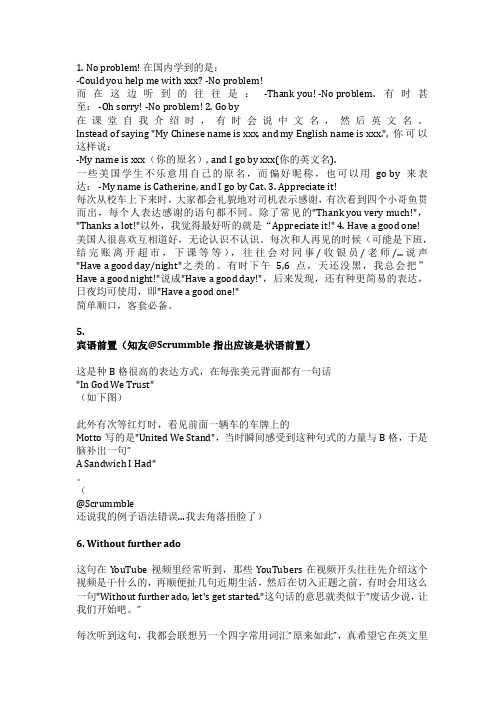
1.No problem!在国内学到的是:-Could you help me with xxx? -No problem!而在这边听到的往往是: -Thank you! -No problem.有时甚至: -Oh sorry! -No problem!2.Go by在课堂自我介绍时,有时会说中文名,然后英文名。
Instead of saying"My Chinese name is xxx,and my English name is xxx.",你可以这样说:-My name is xxx(你的原名),and I go by xxx(你的英文名).一些美国学生不乐意用自己的原名,而偏好昵称,也可以用go by来表达: -My name is Catherine,and I go by Cat.3.Appreciate it!每次从校车上下来时,大家都会礼貌地对司机表示感谢,有次看到四个小哥鱼贯而出,每个人表达感谢的语句都不同。
除了常见的"Thank you very much!","Thanks a lot!"以外,我觉得最好听的就是“Appreciate it!"4.Have a good one!美国人很喜欢互相道好,无论认识不认识。
每次和人再见的时候(可能是下班,结完账离开超市,下课等等),往往会对同事/收银员/老师/...说声"Have a good day/night"之类的。
有时下午5,6点,天还没黑,我总会把”Have a good night!"说成"Have a good day!",后来发现,还有种更简易的表达,日夜均可使用,即"Have a good one!"简单顺口,客套必备。
5.宾语前置(知友@Scrummble指出应该是状语前置)这是种B格很高的表达方式,在每张美元背面都有一句话"In God We Trust"(如下图)此外有次等红灯时,看见前面一辆车的车牌上的Motto写的是"United We Stand",当时瞬间感受到这种句式的力量与B格,于是脑补出一句“A Sandwich I Had"。
20个特别地道的英语用法,据说中国学生都不熟

1.I'm goodI'm good除了可以用来回答How are you?,表示“我很好”之外,还常用于:- Do you want some chips with your sandwich?你的三明治要带薯条吗?- No, I'm good. Thanks.不用了,谢谢。
- Do you have any questions?你还有什么问题吗?- No, I'm good.没有了。
也可用作委婉拒绝。
- Do you wanna go to a strip club?要不要去看脱衣舞?- I'm good.不去啦。
2. Go by在课堂自我介绍时,有时会说中文名,然后英文名。
Instead of saying "My Chinese name is xxx,and my English name is xxx.", 你可以这样说:My name is xxx (中文名), and I go by xxx (英文名).Go by即“被叫做,人们常叫我……”,“To be called; be known”。
例如:Our friend William often goes by Billy.我们的朋友William,我们一般都叫他Billy。
一些美国学生不乐意用自己的原名,而偏好昵称,也可以用go by来表达:My name is Catherine, and I go by Cat.我的名字是Catherine,你们可以叫我Cat。
3. Appreciate it!在美国,每次下公交车的时候,大家都会礼貌地对司机表示感谢,有次看到四个小哥鱼贯而出,每个人表达感谢的语句都不同。
除了常见的"Thank you very much!","Thanks a lot!"以外,我觉得最好听的就是“Appreciate it!"Appreciate it,完整意思就是:I appreciate what you have done for me.我非常感谢你为我做的事。
初三 交际用语2
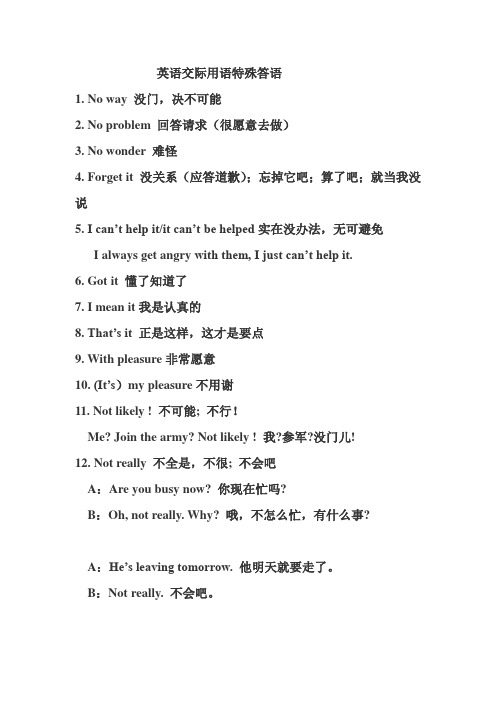
英语交际用语特殊答语1. No way 没门,决不可能2. No problem 回答请求(很愿意去做)3. No wonder 难怪4. Forget it 没关系(应答道歉);忘掉它吧;算了吧;就当我没说5. I can’t help it/it can’t be helped实在没办法,无可避免I always get angry with them, I just can’t help it.6. Got it 懂了知道了7. I mean it我是认真的8. That’s it 正是这样,这才是要点9. With pleasure非常愿意10. (It’s)my pleasure不用谢11. Not likely ! 不可能; 不行!Me? Join the army? Not likely ! 我?参军?没门儿!12. Not really 不全是,不很; 不会吧A:Are you busy now? 你现在忙吗?B:Oh, not really. Why? 哦,不怎么忙,有什么事?A:He’s leaving tomorrow. 他明天就要走了。
B:Not really. 不会吧。
13. Not exactly! 不很; 不完全如此A:Do you mean to say he’ll refuse us? 你的意思是说他会拒绝我们?B:Not exactly. 不完全如此。
A:So you missed the meeting. 所以你就错过了这次会议。
B:Not exactly. I got there five minutes before it finished. 不完全是这样,我在散会前五分钟赶到了那儿。
14. Come on 催促,鼓励; 算了吧,得了吧(Oh, come on ,don’t lie to me.算了吧,得了吧,别撒谎.)15. Why not 好哇,干嘛不(同意建议)16. Help yourself随便吃,自己拿、取17. How come?怎么会呢(惊讶)How come you didn't come to join us last night?为什么你昨天晚上不来和我们一起玩呢?18. So what? 那又怎样19. What for? 为了什么20. What if?如果...将会怎么样?What if it is true? 如果这是真的又该如何呢?21. It’s a deal成交22. It’s my treat我请客23. I can’t agree more完全同意24. It depends看情况,视……而定25. (It’s)Up to you 由你决定吧26. Absolutely完全可以27.Go ahead开始吧,请吧一、Never mind与Not at all例1 —Sorry, I made a mistake again.—_____. Practise more and you’ll succeed.A. Never mindB. Certainly notC. Not at allD. Don’t mention it例2 —Do you mind if I record your lecture?—_____.Go ahead.A. Never mindB. No wayC. Not at allD. No, you’d better not分析AC。
高考英语常考五类情景交际用语总结

高考常考五类情景交际用语总结一、“没关系;不要紧;没问题;别提了…”类⒈ Never mind意为“没关系;不要紧;不用费事”,常用于以下几种场合:1)当别人向你致歉时;2)请对方放心或安慰对方时注意:由于受字面意思的影响,很多学生把Never mind用于对Do\Would you mind…的否定回答。
对Do\Would you mind…表示“不介意”时常用No, not at all;of course not;certainly not;No, please;No,go ahead等;表示“介意”的回答为You had better not;You’d rather not;I’m afraid…not;I’m sorry,but…等。
⒉Forget it 意为“没关系;不要紧;别提了”,通常用于以下场合:1)当别人向你致歉时;2)不同意对方要求的委婉拒绝⒊No problem意为“没问题;成”。
通常用于对别人的请求表示同意。
类似的表达还有:All right;OK。
⒋It doesn’t matter相当于No matter,意为“没关系;不要紧”,通常用于对别人道歉的答语。
二、pleasure类⒈It’s a pleasure to do …意为“很高兴做…”,相当于Pleased\Nice\Glad to do。
⒉It’s a pleasure=A pleasure=My pleasure,意为“不用谢;没关系;这是我乐意做的”,通常是对thank you 的回答。
⒊With pleasure=Yes\Certainly,意为“当然可以;愿意效劳”。
类似的答语还有:All right;OK;No problem;I’d like to等,主要用于对别人的请求表示乐意去做的场合。
三、all right 类⒈That’s all right意为“不用谢;没关系”,主要用于对感谢或歉意的礼貌回答。
Never,mind的口语用法
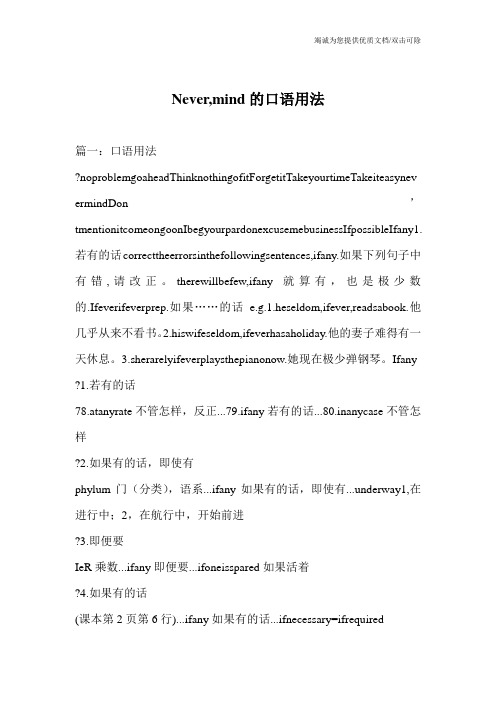
Never,mind的口语用法篇一:口语用法?noproblemgoaheadThinknothingofitForgetitTakeyourtimeTakeiteasynev ermindDon’tmentionitcomeongoonIbegyourpardonexcusemebusinessIfpossibleIfany1.若有的话correcttheerrorsinthefollowingsentences,ifany.如果下列句子中有错,请改正。
therewillbefew,ifany就算有,也是极少数的.Ifeverifeverprep.如果……的话 e.g.1.heseldom,ifever,readsabook.他几乎从来不看书。
2.hiswifeseldom,ifeverhasaholiday.他的妻子难得有一天休息。
3.sherarelyifeverplaysthepianonow.她现在极少弹钢琴。
Ifany ?1.若有的话78.atanyrate不管怎样,反正...79.ifany若有的话...80.inanycase不管怎样?2.如果有的话,即使有phylum门(分类),语系...ifany如果有的话,即使有...underway1,在进行中;2,在航行中,开始前进?3.即便要IeR乘数...ifany即便要...ifoneisspared如果活着?4.如果有的话(课本第2页第6行)...ifany如果有的话...ifnecessary=ifrequired1.s,ifany.如有错误,请改正。
2.American,ifthereareany.如果有的话,最好是美国造的。
3.havingfewifanyteeth.如果有牙齿也是很少的。
4.Ifyouneedanyhelp.需要帮助的话。
5.Ifyoustillhaveany.如果还有的话。
guesswhat?猜猜看?干嘛?what?/whatdoyouwant?/what’swrong?/whatdoyouthinkyouaredoing?/whathappened?/whatfor? noproblem的口语用法1.用来回答感谢(主要用于美国英语中),意为:不用谢;别客气;没什么。
ver,mind的口语用法
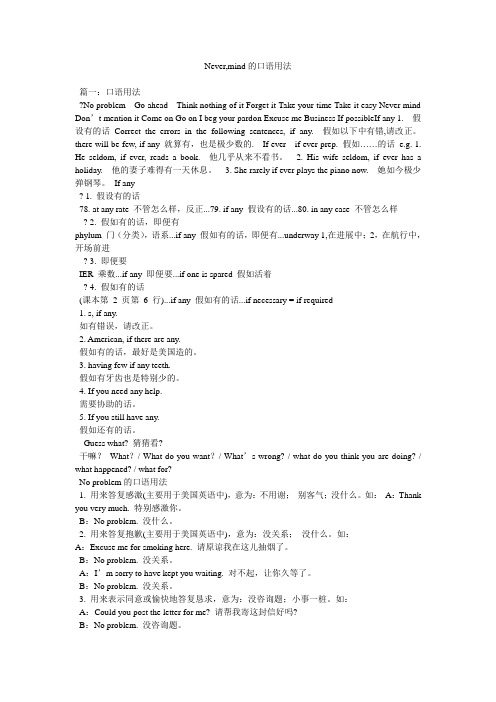
Never,mind的口语用法篇一:口语用法?No problem Go ahead Think nothing of it Forget it Take your time Take it easy Never mind Don’t mention it Come on Go on I beg your pardon Excuse me Business If possibleIf any 1. 假设有的话Correct the errors in the following sentences, if any. 假如以下中有错,请改正。
there will be few, if any 就算有,也是极少数的. If ever if ever prep. 假如……的话e.g. 1. He seldom, if ever, reads a book. 他几乎从来不看书。
2. His wife seldom, if ever has a holiday. 他的妻子难得有一天休息。
3. She rarely if ever plays the piano now. 她如今极少弹钢琴。
If any? 1. 假设有的话78. at any rate 不管怎么样,反正...79. if any 假设有的话...80. in any case 不管怎么样? 2. 假如有的话,即便有phylum 门(分类),语系...if any 假如有的话,即便有...underway 1,在进展中;2,在航行中,开场前进? 3. 即便要IER 乘数...if any 即便要...if one is spared 假如活着? 4. 假如有的话(课本第2 页第6 行)...if any 假如有的话...if necessary = if required1. s, if any.如有错误,请改正。
2. American, if there are any.假如有的话,最好是美国造的。
20个地道的英语口语表达
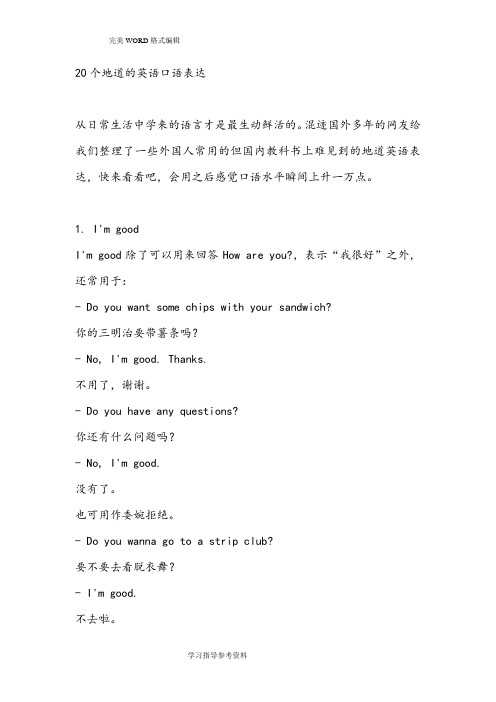
20个地道的英语口语表达从日常生活中学来的语言才是最生动鲜活的。
混迹国外多年的网友给我们整理了一些外国人常用的但国内教科书上难见到的地道英语表达,快来看看吧,会用之后感觉口语水平瞬间上升一万点。
1. I'm goodI'm good除了可以用来回答How are you?,表示“我很好”之外,还常用于:- Do you want some chips with your sandwich?你的三明治要带薯条吗?- No, I'm good. Thanks.不用了,谢谢。
- Do you have any questions?你还有什么问题吗?- No, I'm good.没有了。
也可用作委婉拒绝。
- Do you wanna go to a strip club?要不要去看脱衣舞?- I'm good.不去啦。
2. Go by在课堂自我介绍时,有时会说中文名,然后英文名。
Instead of saying "My Chinese name is xxx, and my English name is xxx.", 你可以这样说:My name is xxx (中文名), and I go by xxx (英文名).Go by即“被叫做,人们常叫我……”,“To be called; be known”。
例如:Our friend William often goes by Billy.我们的朋友William,我们一般都叫他Billy。
一些美国学生不乐意用自己的原名,而偏好昵称,也可以用go by来表达:My name is Catherine, and I go by Cat.我的名字是Catherine,你们可以叫我Cat。
3. Appreciate it!在美国,每次下公交车的时候,大家都会礼貌地对司机表示感谢,有次看到四个小哥鱼贯而出,每个人表达感谢的语句都不同。
- 1、下载文档前请自行甄别文档内容的完整性,平台不提供额外的编辑、内容补充、找答案等附加服务。
- 2、"仅部分预览"的文档,不可在线预览部分如存在完整性等问题,可反馈申请退款(可完整预览的文档不适用该条件!)。
- 3、如文档侵犯您的权益,请联系客服反馈,我们会尽快为您处理(人工客服工作时间:9:00-18:30)。
3. 用来表示同意或愉快地回答请求,意为: 没问题;小事一桩。如: A:Could you post the letter for me? 请帮我寄这封信好吗? B:No problem. 没问题。 A:Would you mind my keeping it for another week?我可以再借一个星期吗? B:No problem. 没问题。
5. 用来表示安慰(也说That’s no problem), 意为:没问题;那不成问题。如:
A:I’ve left my money at home. 我把钱忘在家里了。 B:(That’s) no problem. I can lend you what you need. 那没问题,你要多少我可以借给你。
4. 用来表示有能力做某事,意为: 没问题;不在话下。如:
A:Can you make a kite? 你会做风筝吗? B:No problem. 没问题。 A:Can you finish the work in an hour? 你能在一小时内做完这工作吗? B:No problem. 没问题。’s the problem? 有什么问题吗? B:No problem. Granpa has solved it. 没问题,爷爷已把它解决了。
No problem 的口语用法
1.用往返答感谢(主要用于美国英语中), 意为:不用谢; 别客气;没什么。如:
A:Thank you very much. 非常感谢你。 B:No problem. 没什么。
2. 用往返答道歉(主要用于美国英语中), 意为:没关系; 没什么。如: A:Excuse me for smoking here. 请原谅我在这儿抽烟了。 B:No problem. 没关系。 A:I’m sorry to have kept you waiting. 对不起,让你久等了。 B:No problem. 没关系。
